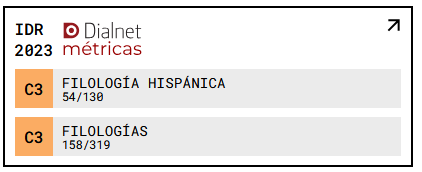« Nothing makes so fine show as your greek » : un préambule au tréfonds philo-hellénique de Poe dans « How to write a blackwood article » et « A predicament »
DOI :
https://doi.org/10.18172/cif.3599Mots-clés :
Poe, "A Predicament", "Blackwoods", grec, Littérature helléniqueRésumé
Les nouvelles «How to Write a Blackwood Article» et «The Scythe of Time» de Poe ont toutes deux attiré l’attention de nombreux érudits et par leur lien indéniable entre elles et et par leur ton satirique. Des études telles que celles de Daniel Hoffman et Kenneth Silverman ont pris note de la satire voilée de Poe contre certaines littératures étrangères. En fait, Poe n'hésite pas à citer plusieurs auteurs étrangers dans le texte et à l’admettre tout de suite après. Or, même s’il est possible de trouver des études telles que celles de Gustav Gruener, Carl F. Schreiber et Susan Levine centrées sur les influences allemande et espagnole sur l’oeuvre de Poe, il n’existe pas de travaux qui explorent systématiquement l'aspect hellénique de la question. Cet article met l’accent sur l’importance de la langue et de la littérature helléniques dans les textes littéraires de Poe et établit également des liens supplémentaires entre «A Predicament» et la mythologie hellénique, connexions qui ont peut-être été négligées, jusqu’à présent, par les études critiques sérieuses.
Téléchargements
Références
AMPER, S. (1992). “Untold story: The lying narrator in ‘The Black Cat’”. Studies in Short Fiction 29 (4): 475-85.
CAMPBELL, K. (1933). “Three Notes on Poe”. American Literature 4 (4): 385-88. DOI: https://doi.org/10.2307/2919625
DAUGHRITY, K. L. (1930). “Notes: Poe and Blackwoods”. American Literature 2 (3): 289-92.
DISCH, T. (2000). The Dreams Our Stuff Is Made Of: How Science Fiction Conquered the World. New York: Touchstone.
DORO, L. (1944). “Aion”. Hesperia 13 (4): 274. DOI: https://doi.org/10.2307/146699
DROST, C. (2006). Illuminating Poe: The Reflection of Edgar Allan Poe’s Pictorialism in the Illustrations for the Tales of the Grotesque and Arabesque. University of Hamburg: UMI.
GOODMAN, M. (2008). The Sun and The Moon: The Remarkable True Account of Hoaxers, Showmen, Dueling Journalists, and Lunar Man-Bats in Nineteenth-Century New York. New York: Basic Books.
GRUENER, G. (1904). “Poe’s Knowledge of German”. Modern Philology 2 (1): 125. DOI: https://doi.org/10.1086/386631
HANTIU, E. (2010). “Humor and Satire in Edgar Allan Poe’s Absurd Stories”. Edgar Allan Poe Review 11 (2): 28-35. DOI: https://doi.org/10.2307/41506410
HOFFMAN, D. (1972). Poe Poe Poe Poe Poe Poe Poe. New York: Doubleday & Company Inc.
IMPELLUSO, L. (2008). Myths: Tales of the Greek and Roman Gods. New York: Abrams.
KENNEDY, G. J. (Ed.) (2001). A Historical Guide to Edgar Allan Poe. New York: Oxford UP. DOI: https://doi.org/10.1093/oso/9780195121490.001.0001
LEVINE, S. and LEVINE, S. (1986). “‘How-to’ Satire: Cervantes, Marryat, Poe”. Modern Language Studies 16 (3): 15-26. DOI: https://doi.org/10.2307/3194883
MCELRATH, J. R. (1970). “Poe’s Conscious Prose Technique”. NEMLA Newsletter 2 (2): 38-43.
MEYERS, J. (2000). Edgar Allan Poe: His Life and Legacy. New York: Cooper Square.
POE, E. A. (1978). The Collected Works of Edgar Allan Poe, vol. II. (Ed. Thomas Ollive Mabbott). Cambridge: The Belknap Press of Harvard University Press.
POE, E. A. (1838). “‘The Psyche Zenobia” and “The Scythe of Time’”. American Museum 1 (3): 301-17. <http://www.eapoe.org/works/tales/blkwda.htm>
POLLIN, B. (2001). “Poe’s Greek: A Short Prolegomenon to a Long Inquiry.” Edgar Allan Poe Review 2 (2): 71-77.
SANIDOPOULOS, J. (2014). “Edgar Allan Poe As A Philhellene.” Honey and Hemlock. . (Accessed 28 Mar. 2017).
SCHREIDER, C. F. (1930). “Mr. Poe at his Conjurations Again.” The Colophon 2 (1): 1-11.
SILVERMAN, K. (1992). Edgar A. Poe. A Biography. Mournful and Never-Ending Remembrance. London: Weidenfeld & Nicolson.
SOMMERFELD, S. (2012). “Post-Kantian Sublimity and Mediacy in Poe’s ‘Blackwood’ Tales.” The Edgar Allan Poe Review 13 (2): 33-49. DOI: https://doi.org/10.2307/41717104
THOMAS, R. D. and DAVID, K. J. (1987). “Chapter 03” in The Poe Log. Boston: G.K. Hall & Co.
TRIEBER, M. J. (1971). “The Scornful Grin: A Study of Poesque Humor”. Poe Studies: History, Theory, Interpretation 4 (2): 32. DOI: https://doi.org/10.1111/j.1754-6095.1971.tb00169.x
TSAMIS, C. (2009). “ΠΕΡΙ ΧΡΟΝΟΥ [REGARDING TIME]”. Πανελλήνιο Σχολικό Δίκτυο, European Union. <http://users.sch.gr/xtsamis/OkosmosMas/Xronos.htm>. (Accessed 15 October 2016).
VAN DER HORST, P. W. (1999). “Aion” in Dictionary of Deities and Demons in the Bible. Eds. Pieter W. Van Der Horst and Bob Becking. Brill: Eerdmans Publishing Company.
Téléchargements
Publié-e
Comment citer
Numéro
Rubrique
Licence
Les articles appartiennent à leurs auteurs respectifs qui accordent à la revue le droit de première publication, l’autorisation de la revue n’étant pas nécessaire pour leur diffusion une fois publiés. Une fois la version de l’éditeur publiée, l’auteur est tenu de s’y référer dans les versions archivées dans les dépôts personnels ou institutionnels.
Il est conseillé aux auteurs/s d’archiver la version de l’éditeur dans des dépôts institutionnels.
La revue permettant à d'autres de réutiliser les ouvrages selon les conditions de la licence CC Attribution 4.0 International (CC BY 4.0)














